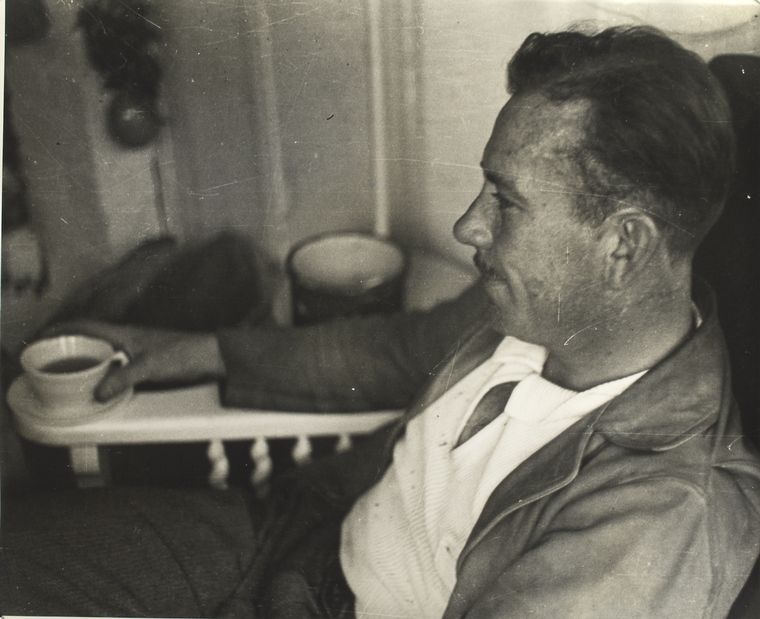Our 7 Favorite Literary Coffee Shops
Writers and coffee go together like espresso and steamed milk. Everywhere you look, there's a writer plugging away on their laptop in a cafe, usually with a steaming cup of joe by their side. Caffeine stimulates the brain and increases productivity—something I know because I drank three cups of coffee before writing this blog post—but that's not the only reason why writers huddle in coffeehouses. Cafes all over the world have long been hubs for writing communities, like the Beats or the Lost Generation, to discuss ideas, read poetry, and of course, write. Many of these historical sites are still around, serving coffee and tea to the next generation of young writers in Paris, New York, and Rome, who, like their bohemian forebears, are looking for a cheap place to hang out that's not their apartment. Here are seven of our favorite literary cafes from around the globe.
The Elephant House, Edinburgh
This charming little coffee shop in Scotland became known internationally when a cafe regular published a little book called Harry Potter and the Sorceror's Stone. As it turns out, J.K. Rowling wrote much of her early novels here, and the cafe is frequented by authors Ian Rankin and Alexander McCall-Smith. It's a common tourist destination, but that hasn't cheapened its literary magic; the breathtaking view of Edinburgh Castle from the cafe's window is as inspiring as ever.

Caffe Reggio, New York
Much has changed in Greenwich Village since Jack Kerouac, Allen Ginsberg, and Bob Dylan hung out there in the 1950s and '60s, but Caffe Reggio is still going strong. Claiming to be the first coffee shop to serve cappuccino in America, Caffe Reggio has been a New York institution since its founding in 1927, and was a favorite coffee spot for Kerouac and beat poet Gregory Corso back in the day. Along the way, the cafe has also been featured in numerous films, such as Shaft, Serpico, and Inside Llewyn Davis, and the ceiling fan is a prop from the movie Casablanca.

Caffe Trieste, San Francisco
Here's another famous beat hangout: one of the first espresso houses on the West Coast, Caffe Trieste began in North Beach in 1956 and has since grown into a small chain in San Francisco and Monterey Bay. Kerouac and Ginsberg were regulars here as the Beat movement caught fire in San Francisco, and Lawrence Ferlinghetti, co-founder of the historic City Lights Bookstore, is still a customer. It's also hallowed in the world of film: Francis Ford Coppola wrote much of the script of The Godfather on a typewriter in this cafe.

La Closerie des Lilas, Paris
The Lost Generation of the 1920s loved French cafes, and several in Montparnasse were visited by Ernest Hemingway, F. Scott Fitzgerald, Henry Miller, James Joyce, and more of their ilk. We could just as easily have chosen Le Dome Cafe or Le Select, which had the same literary clientele, but La Closerie des Lilas is where Hemingway wrote much of The Sun Also Rises, and where, it's said, Fitzgerald first presented Hemingway with a draft of The Great Gatsby. Hemingway wrote in A Moveable Feast that La Closerie des Lilas was "one of the best cafes in Paris," and its welcoming atmosphere also attracted Apollinaire, Man Ray, Jean-Paul Sartre, and Samuel Beckett.
Caffe Pedrocchi, Padua
This historic cafe was founded in 1772, and it quickly became a hotspot for artists, thinkers, and writers in Padua. The French playwright Stendhal was a regular guest, as was Romantic poet Lord Byron. The cafe was expanded into a palatial neoclassical building encompassing a full city block in 1831, and in the 1840's Paduans planned an uprising against Austrian occupation there, fomenting revolution in a local newspaper that bore the cafe's name. More recently, Nobel Prize-winning Italian playwright Dario Fo has frequented the cafe.

Cafe Montmartre, Prague
In the early 20th century, modernism was coming to life in Prague, and Cafe Montmartre in the Old Town was the gathering place for writers, artists, and thinkers. Franz Kafka and Max Brod were noted guests, Cubist and Expressionist art decorated the walls, and the cafe held nightly discussions and readings in Czech, German, and Yiddish, reflecting the rich blend of cultures that made Prague a hotbed of intellectualism.

Antico Caffe Greco, Rome
Antico Caffe Greco was founded in 1760, making it the oldest cafe in Rome, and it's been a favorite spot of writers and philosophers for centuries. The cafe was visited by John Keats, Percy Bysshe Shelley, and Lord Byron; by German authors Karl Philipp Moritz and Wilhelm Muller, who had coffee there every day; by Hans Christian Andersen, James Fenimore Cooper, and Nikolai Gogol, who is reputed to have written a few pages of his novel Dead Souls there. Dozens of other artists and writers have documented their visits there, and if you're ever in Rome, this is a literary landmark you won't want to miss.
What's your favorite coffee shop to write in? Maybe someday it'll be a landmark, too, so let us know in the comments!
Read E-Books with SimplyE
 With your library card, it's easier than ever to choose from more than 300,000 e-books on SimplyE, The New York Public Library's free e-reader app. Gain access to digital resources for all ages, including e-books, audiobooks, databases, and more.
With your library card, it's easier than ever to choose from more than 300,000 e-books on SimplyE, The New York Public Library's free e-reader app. Gain access to digital resources for all ages, including e-books, audiobooks, databases, and more.
If you don’t have an NYPL library card, New York State residents can apply for a digital card online or through SimplyE (available on the App Store or Google Play).
Need more help? Read our guide to using SimplyE.
